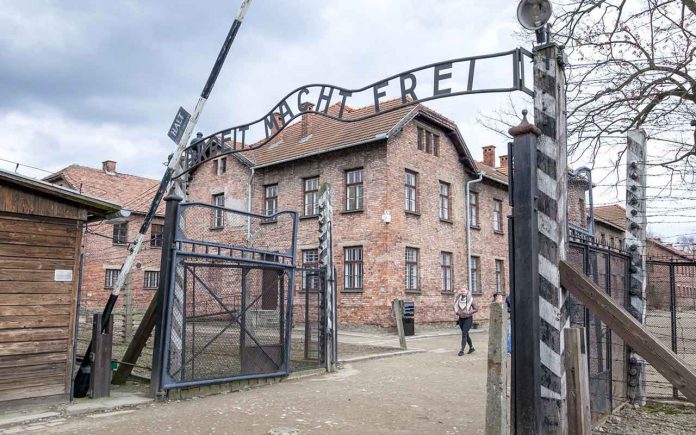
Evron is one of the thousands of Jews whose families’ property was seized by Poland’s Nazi occupiers and then kept by its postwar communist rulers
By Joanna Plucinska and Dan Fastenberg
WARSAW/NEW YORK (Reuters) – Lea Evron, 85, has only fragments of memories of the fur factory and the three-story apartment building her family-owned before World War Two in Zywiec, a small town in southern Poland.
What she does remember clearly is returning after the war, when most of her family had been killed in the Holocaust.
A local woman said to her and her mother “Hitler promised to get rid of all of the Jews, and here they come home,” Evron told Reuters in her apartment in New York.
Evron and her mother were told they could live in the apartment building, but only in the maids’ quarters. They moved to Israel soon afterwards.
Evron is just one of the thousands of Jews whose families’ property was seized by Poland’s Nazi occupiers and then kept by its postwar communist rulers.
Home to one of the world’s largest Jewish communities before the war, Poland is the only EU country that has not legislated on property restitution.
To make matters more difficult, Jews say documents proving property ownership were often destroyed in the Holocaust.
As the 75th anniversary of the liberation of Auschwitz, the Nazi German death camp, approaches on Jan. 27, they say it’s time for Poland to make the process easier.
“Holocaust survivors … shouldn’t have to suffer now. They are dying without justice in Poland,” said Lea’s husband, Jehuda Evron, 88.
Poland’s ruling Law and Justice party, supported by far-right groups, has rejected demands for clearer rules on restitution, despite pressure from the United States.
“Something that should be fundamentally a moral question – I had a house, the Nazis stole it, the Soviets stole it, I should get it back – is now being made into a political question,” Poland’s Chief Rabbi, Michael Schudrich, told Reuters, referring to comments by far-right groups.
LOST PROPERTY
Poland has grappled with the issue since communism fell in 1989, with many arguing that it simply cannot afford to repay everyone who lost property.
No new legislation has emerged and Jews complain that courts and administrators are making decisions often derived from communist laws.
The Evrons launched their first legal case in 1992, spurred by promises from politicians like former president Lech Walesa that restitution would be handled quickly.
The couple wants to recover property from the government, which took ownership under communism.
In the 1990s, the government sold the residential building they once owned to an individual who turned it into a shopping mall, despite the Evrons’ offers to purchase the property, thus complicating matters further.
Appeals by the new owner lengthened the process even further. While many courts have ruled in favour of the Evrons over almost three decades, the couple has received nothing.
They have probably spent more money on the legal case than the value of the assets themselves.
“I can show you the full cabinet of correspondence and documents related to this issue and unfortunately it’s going nowhere,” Evron said.

SOCIAL ATTITUDES
Lawyers told Reuters that it is getting more difficult for Holocaust survivors to get restitution as the government refuses to simplify the rules and courts grow more sceptical.
Social attitudes have also shifted.
Soon after the fall of communism, many Poles accepted that property taken by the Nazis, and then the communists, should be returned to its rightful owners. But many now feel it is unfair to expect the government to reimburse everybody.
History also plays a role.
Communist authorities praised the Poles’ behaviour during the war, but research since 1989 showed that while thousands risked their lives to help the Jews, thousands more participated in the Holocaust.
Many Poles refuse to accept that, and the government is pushing back against claims of wartime misconduct, saying the West does not appreciate Poland’s bravery under the Nazis.
In June, Poland’s President Andrzej Duda told Reuters anti-Semitic and anti-Polish sentiments were comparable. “[The Nazis] destroyed the Jews as a nation, but they also destroyed us as a nation,” Duda said.
An opinion poll last year showed more Poles were against restitution than for. That has made some courts and administrators more stringent about restitution, lawyers said.
Robert Winnicki, leader of Poland’s right-wing Confederation grouping, said U.S. legislation intended to exert pressure for restitution is the work of Jewish groups aiming “to cash in on large amounts of money that they don’t deserve”.
Lawyers meanwhile call for legislation to speed up restitution for ageing Holocaust survivors.
Lea Evron has her doubts. “I don’t want to hope because I don’t believe that they will return anything.”
(Reporting by Joanna Plucinska in Warsaw, Dan Fastenberg in New York, Editing by Justyna Pawlak and Giles Elgood)
